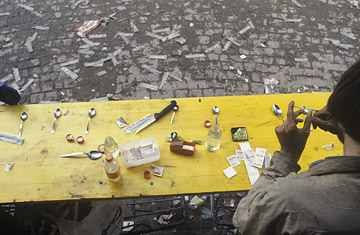
Every day is a happy one for Claudia Heun. The 38-year-old Zurich resident knows that, rain or shine, she will get her daily dose of heroin without having to roam the city's seedy neighborhoods in search of the drug. But an upcoming referendum could radically change her life and that of the some 1300 other Swiss addicts who have been getting their fixes legally for years.
Switzerland's heroin-assisted treatment program (HAT), launched in 1994, doles out pure, industrially produced heroin under medical supervision in 21 clinics and two prisons. "This has made such a positive difference in my life," says Heun, who scored hits on Zurich's once-notorious open drug scene before being admitted into the government-run program in 1995. though she's proven unable to kick addiction through conventional rehab, she has since been able to hold a job, and feels "mentally stronger."
Now that policy, meant to keep addicts off the streets and reduce crime, is in the hands of Swiss voters, who will decide on November 30 whether to approve a narcotics law, passed by parliament earlier this year, that continues HAT after its mandate runs out at the end of 2009. They will also vote on whether to decriminalize the production and consumption of cannabis, although Switzerland's current legislation on the matter is lax and penalties for private use rarely enforced. (See pictures of Mexico's drug trafficking industry.)
The HAT experiment was borne out of the closing, in the early 1990s, of Zurich's infamous Letten "needle park," where thousands of addicts from across Europe gathered to shoot heroin on garbage-strewn railway tracks. "We wanted to offer a program to reach out to these people," says Dr. Adrian Kormann, medical director of a Zurich HAT clinic where Heun is treated. "And we knew that an approach based only on repression doesn't work."
Instead, Swiss government convened expert scientific and ethical advisory bodies that devised a liberal alternative to "zero-tolerance" drug policies practiced elsewhere, focusing on prevention, harm reduction, and therapy. Switzerland's stance of giving the most severely dependent addicts not only heroin, but also counseling and medical treatment, has since spawned similar programs in Great Britain and the Netherlands. A handful of other countries are considering implementing this strategy as well.
Though the long-term goal of the program is to get addicts off the drug says Kormann, "our immediate priority is survival, reintegration into society, and reducing crime. In this regard, we have been very successful."
Indeed, official figures show that drug-related crime, deaths, and HIV rates among HAT participants have dropped significantly, and some of the formerly unemployed patients were able to find and keep jobs. "In many cases, patients' mental and physical health has improved, their housing situation stabilized, and contacts with addicts and the drug scene have decreased," the Federal Office of Public Health says.
Though polls show 63% of voters favor the HAT law, it remains controversial for many. Drogstop, an organization made up mostly of conservative parties and religious groups, warns that if the law is accepted by the electorate, "government-sanctioned heroin distribution will be extended to cocaine and other drugs." Drogstop also argues that the HAT program, which is bankrolled by insurance companies, contributes to exorbitant health and social costs.
Kormann denies what he calls "scare tactic" allegations, insisting there's "no scientific proof that cocaine substitution would be effective." And he says that the price tag for keeping an addict in the program and off the street — approximately $300 a week — is far lower than what taxpayers would have to shell out if he or she were on the street. A 2004 World Health Organization report concluded that for every dollar invested in the HAT program, $12 is saved on law enforcement, judicial, and health costs. While both sides debate the issue, ultimately the decision on HAT's fate is up to the voters. If they reject the law, the program's future is hazy. And that's one scenario that doesn't sit well with Heun. "For everyone's sake," she says, "I really hope the people will vote 'yes.'" Otherwise, she fears she and her fellow addicts might be be back on the streets.
